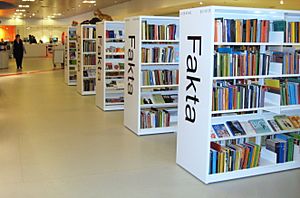Fact facts for kids
A fact is something that is real or true. It is a statement that can be shown to be correct. If something is a fact, it means it has truly happened or is actually the way things are.
You can often check if a statement is a fact by seeing if it can be proven. For example, you might look in reliable books or ask experts. In science, facts are checked very carefully. Scientists use observation and measurement through experiments to make sure something is a fact.
Contents
What is a Fact Statement?
A fact is a statement about something that is true. It can answer questions like, "What color is the sky?" or "Who built that house?"
Facts vs. Opinions
It is important to know the difference between a fact and an opinion. An opinion is what someone thinks or feels, and it might not be true for everyone. A fact, however, is something that can be proven.
For example, if someone asks, "What does Alice think about the book?" You could say, "Alice said she likes the book." It is a fact that Alice said she likes the book. But it might not be a fact that Alice truly likes the book, because she might be pretending.
It can sometimes be tricky to tell if something is a fact or an opinion. If you want to find out a fact, it helps to ask many different people the same question. The parts of their stories that are the same are more likely to be facts. The parts that are different are probably opinions.
A great way to know a fact is if you can see it for yourself. If you ask, "Do you have my book?" and the person shows you your book, then it is a fact that they have it.
Examples of True Facts
Here are some examples of statements that are facts:
- Your heart pumps blood all around your body.
- The leaves on most growing plants are usually green.
- People use their legs to walk from one place to another.
- Many people keep dogs as pets in their homes.
- One liter of water weighs about one kilogram.
- There are 50 states in the United States.
Examples of False Statements
These are statements that are not facts; they are false:
- Water always comes from the sky. (Water can come from many places, like rivers or taps.)
- Dogs are made of cheese. (Dogs are living animals, not food.)
- All people read books. (Many people read, but not everyone.)
- Cows live under water. (Cows live on land.)
- There are horses alive on the moon. (Horses live on Earth, and there is no life on the moon.)
Scientific Theories and Facts
A scientific theory is a well-explained idea about how something in nature works. The ideas in a scientific theory are based on many important facts. These facts always have strong evidence that shows they are true and not false.
Scientists use a special way of thinking called the scientific method to test if the facts in a theory are correct. When statements have been tested many times and shown to be true, they are accepted as facts. The facts that make up a scientific theory have usually been questioned and tested for a very long time by many different scientists.
Because of this careful testing, we know that the knowledge in a scientific theory is based on facts, not just opinions. Good examples of scientific theories include the theory of relativity (about space and time) and the theory of evolution (about how living things change over time).
See also
 In Spanish: Hecho (filosofía) para niños
In Spanish: Hecho (filosofía) para niños
 | Isaac Myers |
 | D. Hamilton Jackson |
 | A. Philip Randolph |


